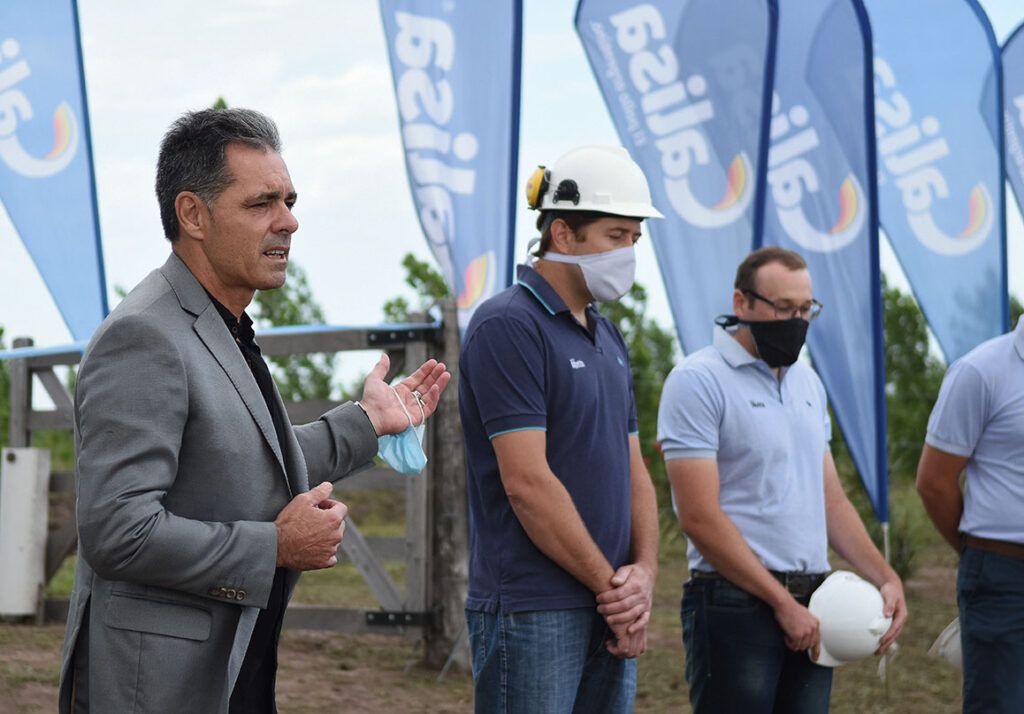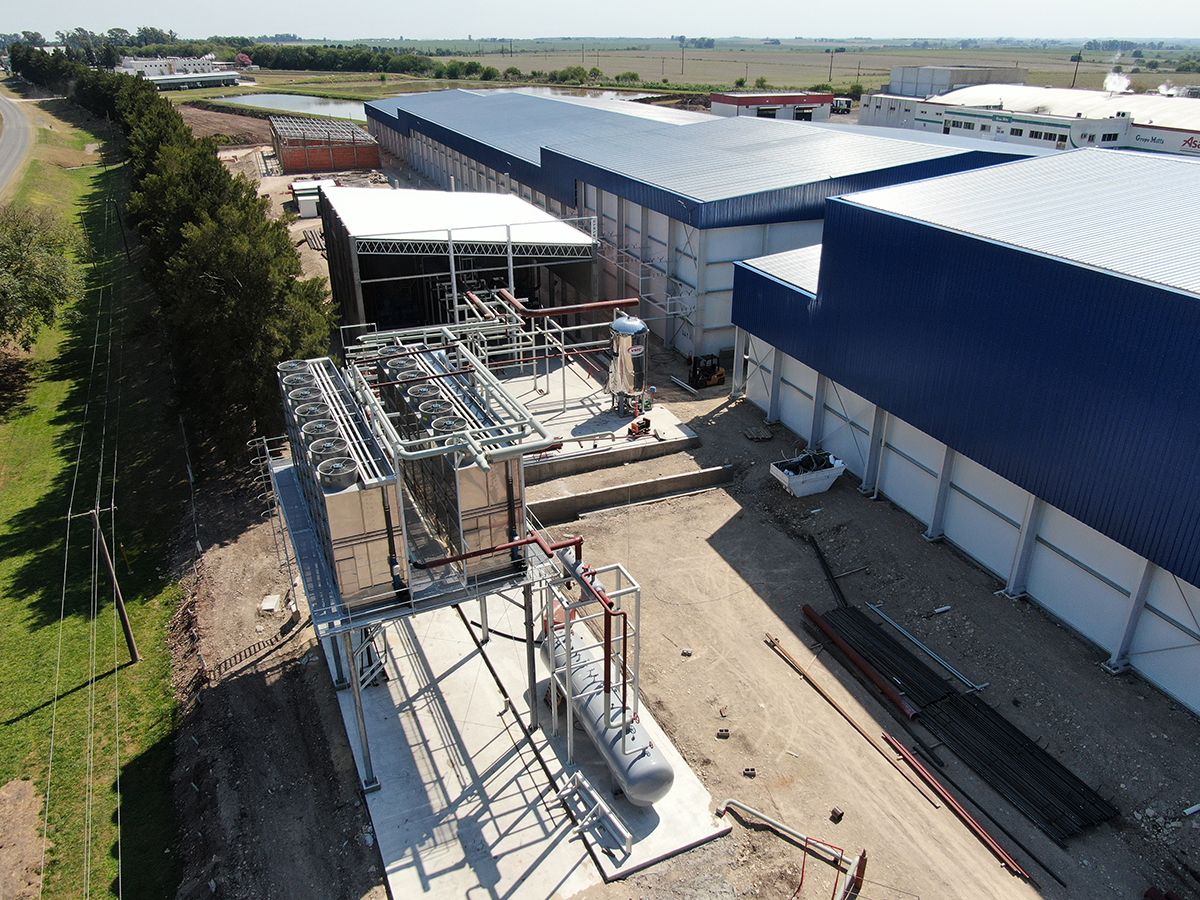Valor agregado al producto, inversión continua y diversificación comercial son los pilares que sostienen el éxito de Complejo Alimentario S.A., CALISA, la empresa del Grupo Motta que celebra este mes 21 años de actividad.
Grupo Motta nació en 1958 como una empresa regional que sólo abastecía al mercado de Entre Ríos. En la actualidad, distribuye sus productos diariamente a toda la Argentina y a diferentes destinos del mundo.
En el 2000, Grupo Motta inició Complejo Alimentario S.A., conocido como CALISA, especializado en el procesamiento de carne de aves y agregado de valor a productos elaborados.
Entrevistamos a Augusto Motta, presidente del Directorio y CEO de CALISA para que nos cuente cómo recibe la empresa estos primeros 21 años.
¿Cuándo comenzó su gestión al frente de la empresa y qué balance hace?
En 1995 ingresé al mundo empresarial al lado de mi padre, quien es fundador del grupo, Héctor Motta. Hacia el año 1998 llevé adelante tareas gerenciales vinculadas a la Cabaña Avícola Feller y, dicho año, comenzamos a vislumbrar el nuevo proyecto de Grupo Motta: CALISA.
Desde su génesis, CALISA se insertó en la industria del procesamiento de aves fundando su modelo de negocios en tres pilares fundamentales: Agregado de valor, inversión continua y diversificación comercial.
Esos lineamientos han sido fundamentales para el crecimiento constante y el desarrollo de la compañía.
Actualmente, considero que hemos dado grandes saltos cualitativos. Vinculamos no sólo nuestra imagen a cuestiones de innovación y desarrollo, sino que trabajamos bajo parámetros de Sustentabilidad y Responsabilidad Social. Esto forma parte de nuestro espíritu empresarial, iniciado por mi padre y ahora continuado por la segunda generación.
Nuestra meta como empresa es producir alimentos, pero también transmitir valores y contribuir a que mejore la calidad de vida de nuestra gente, de la provincia y nuestro país. Eso es a lo que aspiramos.
En 2020 llega la pandemia y cambia todo. ¿Hubo proyectos que tuvieron que postergarse? ¿Aparecieron oportunidades durante esta etapa para nuevos proyectos?
La pandemia sin dudas fue un punto de inflexión en todos los órdenes. El desconcierto y el desafío de aprender en el día a día. De todos modos, aunque tuvimos que adaptarnos y lo seguimos haciendo, los proyectos de inversión no se detuvieron. Siempre mantuvimos puesta nuestra mirada en los próximos 10 años.
Por esto, en paralelo a las inversiones en marcha, desarrollamos un Programa Covid al que llamamos ACTIVAMOS, donde cumplimos un fuerte rol social, produciendo insumos y equipamientos requeridos para afrontar la pandemia en nuestra propia empresa y junto a proveedores locales. Además de la utilización interna, colaboramos con hospitales y centros de salud a nivel local y regional. A la par constituimos un Comité Covid con un monitoreo permanente y control de protocolo para preservar y cuidar a nuestra gente y sus familias.

¿Qué es CALISA 2?
Es la nueva planta procesadora de aves que se inaugurará a fines de 2022. El proyecto está avanzado en un 60%. Se emplaza en un predio de 36.000m2 en la localidad de Racedo, Entre Ríos. Nuestra planta actualmente cuenta con una capacidad de faena de 12 millones de aves por año que, con CALISA 2, alcanzará, en un proyecto de 5 a 10 años, un aumento del 400% de su producción.
El proyecto implica una inversión total de U$s25 millones para la expansión y modernización de las operaciones de procesamiento.
Es un gran salto, enmarcado en los parámetros tecnológicos acorde a la actualidad y el futuro venidero.
¿Cuál es el presente de la producción avícola en el país?
Podríamos decir que nos encontramos con plena capacidad productiva y operativa para abastecer tanto al mercado argentino como así también al mercado externo. El desafío más importante que tiene nuestro sector es generar las condiciones para continuar modernizando nuestra cadena productiva, con incorporación de tecnología que soporte la trazabilidad y el aseguramiento de calidad de nuestros productos.
Durante el año 2020 y principios del 2021 evidenciamos un hecho histórico en el consumo interno de Carne Aviar. Por primera vez en la historia en argentina se equiparó al consumo de carne vacuna, llegando a 50 kg. per cápita.
Restaurantes, Hoteles y cadenas de retailers, permanecieron cerrados durante casi todo el 2020, ¿cómo suplieron este inconveniente?
Uno de los grandes desafíos comenzó en el año 2020 con la caída del foodservice. Desde nuestra planta “Asado” se realizan productos elaborados 100% cocidos para una amplia cartera de clientes del sector gastronómico que comprenden desde chefs y restaurantes hasta cadenas como Subway, Burger King y Mostaza.
La baja de consumo prácticamente a foja cero nos llevó a replantear la estrategia comercial y tomar decisiones sobre las unidades comerciales para acercar gran porcentaje de los productos a nuevos Desarrolladores comerciales (distribuidores) y a consumidores finales (Supermercados). Es por ello que lanzamos la línea de productos “familiares” en envases que garantizan el Envasado en origen de productos con los más altos estándares de calidad internacionales. La pandemia cambio el concepto no solamente en la frecuencia de compras/volumen sino también en la necesidad de contar con alimentos que certifiquen la calidad en todo su proceso.

default
Restaurantes, Hoteles y cadenas de retailers, permanecieron cerrados durante casi todo el 2020, ¿cómo suplieron este inconveniente?
Uno de los grandes desafíos comenzó en el año 2020 con la caída del foodservice. Desde nuestra planta “Asado” se realizan productos elaborados 100% cocidos para una amplia cartera de clientes del sector gastronómico que comprenden desde chefs y restaurantes hasta cadenas como Subway, Burger King y Mostaza.
La baja de consumo prácticamente a foja cero nos llevó a replantear la estrategia comercial y tomar decisiones sobre las unidades comerciales para acercar gran porcentaje de los productos a nuevos Desarrolladores comerciales (distribuidores) y a consumidores finales (Supermercados). Es por ello que lanzamos la línea de productos “familiares” en envases que garantizan el Envasado en origen de productos con los más altos estándares de calidad internacionales. La pandemia cambio el concepto no solamente en la frecuencia de compras/volumen sino también en la necesidad de contar con alimentos que certifiquen la calidad en todo su proceso.
¿Cómo está compuesta la línea de productos CALISA?
Contamos con líneas de productos que abarcan pollo entero, trozado, fresco y/o congelado; productos elaborados y productos Foodservice (100% cocidos).
En los últimos años las tendencias de consumo en productos con valor agregado nos permiten detectar incrementos en ventas relacionadas a los productos rebozados (crudos, horneados y prefritos).
¿Con qué cadenas de supermercados trabajan actualmente?
Desde febrero de 2020 tomamos la decisión comercial de consolidar presencia en el segmento retailer a partir de una cartera de productos diferenciales por valores relacionados a la calidad, inocuidad y nutrición. Es por ello que aumentamos del 0.8% al 5% de nuestro market share interno contando con presencia en cadenas nacionales como el Dia% Supermercados y regionales de gran importancia como La Reina Supermercados en Rosario, Alvear Supermercados en Santa Fe, entre otros.
¿Qué porcentaje de la producción se destina al mercado interno y cuánto al exterior?
CALISA es una de las principales empresas exportadoras del sector, con una participación mayor al 45% de su producción para los mercados internacionales. Con la nueva puesta en marcha de nuestra nueva planta frigorífica, estaremos en condiciones de ampliar nuestra capacidad productiva en un 100% en los primeros 5 años, con la firme convicción y visión de ampliar nuestra participación en el mercado internacional.
Actualmente estamos exportando a Angola, Benín, Brasil, Canadá, Chile, China, Rep. Congo, Rep. Democrática Congo, Cuba, Guinea, Haití, Islas Comores, Namibia, Polinesia Francesa, Federación Rusa, Sudáfrica, Uruguay, Vietnam. Entre los mercados habilitados están Perú, Venezuela, México, Unión Europea, Liberia, Ghana, Japón, Emiratos Árabes.
Pensando en el medio ambiente, inauguraron un sistema de riego forestal y efluente cero. ¿En qué consta esta obra y cuál es el impacto para el medio ambiente?
La sostenibilidad es un activo valioso para el Grupo Motta. En la zona industrial de Racedo, se inauguró en diciembre de 2020 el proyecto de Riego Forestal y efluente Cero.
Se encuentra situado a 2,5 km de la planta de CALISA, donde se ubica el sistema de tratamiento de efluentes que abastecerá al predio con el agua de riego. Se trata de 4500 mts de cañerías y 77,5 km de acequias para abastecer a las 32 hectáreas forestadas con un total de 26.656 árboles. El proyecto permite la reducción de la huella hídrica y de carbono, la minimización del impacto sobre el recurso hídrico y la economía circular porque se reutiliza el agua residual del establecimiento, incorporándolo como un insumo clave en un nuevo proceso productivo.
En materia de sustentabilidad, contribuimos con los Objetivos de Desarrollo Sostenible y su impacto en la cadena de valor, son abordados desde las distintas áreas, trabajando e identificando los aportes efectivos.
Actualmente, asimismo, estamos abocados a una reestructuración interna trabajando fuertemente con el área de recursos humanos. Creemos que el énfasis en esta etapa debe estar puesto en potenciar, cuidar y empoderar el talento de los profesionales y colaboradores.
¿Cómo es el proceso de trazabilidad y calidad que desarrollan con sus productos y proveedores?
En cuanto a los productos se trabaja bajo las normas BMP (Buenas Prácticas de Manufactura) que involucran a personal, infraestructura, instalaciones y equipos, mantenimiento y distribución. Los alimentos se producen bajo sistema HACCP que regula y otorga mayor confianza a la inocuidad alimentaria en todos sus procesos de producción. Cuenta con la certificación FOOD BCR, estándar mundial para la seguridad de alimentos y habilitación internacional HALAL para su comercialización en el mercado islámico. En lo referente a Bienestar Animal se trabaja cumpliendo con el bienestar animal de las aves, en todas las etapas bajo los lineamientos de Unión Europea y del National Chicken Council.
Respecto a proveedores se realizan auditorías de control con visitas a instalaciones con el fin de garantizar la optima calidad en toda la cadena de valor. Esta vigilancia estricta nos permite un riguroso control de todo el proceso de trazabilidad.
CALISA es calidad, es innovación, es un equipo que se adapta y crece en comunidad.
#20años
#Calisa
#ElPolloArgentino









